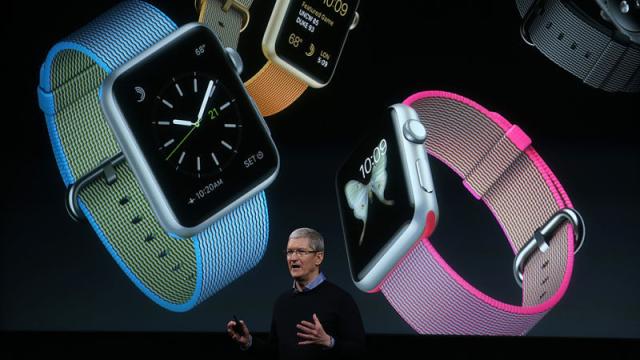Image: Getty Images
If you sacrifice style to strap a clunky Apple Watch or Fitbit to your wrist, one of the tradeoffs is supposedly the ability to better monitor your health. But so far, the health benefits of tracking your step count or heart rate are mostly unproven. In fact, some research has suggested the benefits are actually nil.
But fitness trackers do collect valuable data about your body. It might just be that we’re not putting it to use in the most effective way.
A study being presented today at an annual meeting of the Heart Rhythm Society makes exactly that case. Researchers were interested in finding out whether the heart rate sensor might be useful for monitoring and detecting a serious but often symptomless type of heart arrhythmia, atrial fibrillation. To do so, they paired the optical blood volume sensors commonly found in smart watches with a deep-learning algorithm to hunt for irregularities.
The study partnered with the Cardiogram app and enrolled 6,158 users of it into UCSF’s Health eHeart Study to train an artificial neural network to automatically distinguish atrial fibrillation, which can increase your risk of stroke and heart failure, from normal heart rhythm. Then, in a small study of 51 patients set to undergo a procedure to restore a normal heart rhythm, an Apple Watch was able to correctly detect atrial fibrillation with an accuracy of 97% both before and after surgery.
“Part of that message here is to determine if this tech is even useful to health,” said senior study author Gregory Marcus, the director of clinical research for UCSF’s cardiology department. “Simply marketing this as health tech is not sufficient. Companies should be working with clinical researchers to figure out unmet healthcare needs and what works for patients.”
The results, Marcus said, indicate that with some tinkering, off-the-shelf products can indeed positively impact a user’s health.
Next up, they’re planning bigger trials, as well as trials to test whether the app can detect new diagnoses of atrial fibrillation. A diagnosis from a doctor, Marcus said, will always be required, but a smart watch might be able to flag users who need to go in for a test. Eventually, they will likely release their app to the public.
“The benefit of this is that it leverages this amazing access to data from a sensor people in the public use anyway,” he said. “The next natural step is for companies to start thinking about how to use these devices to actually detect and prevent disease.”
But, he acknowledged, smart watches haven’t really been tested much to prove whether tracking health metrics leads to a real improvement in health. And several studies have in fact found the opposite. One last year, for example, found that people who wore trackers for 18 months while trying to lose weight actually lost less weight than people who went untracked.
Marcus would like to see studies that examine hard outcomes — in this case, whether or not the technology actually leads to fewer strokes and deaths among people with atrial fibrillation.
“You can market that these devices provide heart rate and step count and extrapolate from that that more activity is in general healthy,” he said. “But how do we make sure that those things are truly useful?”
